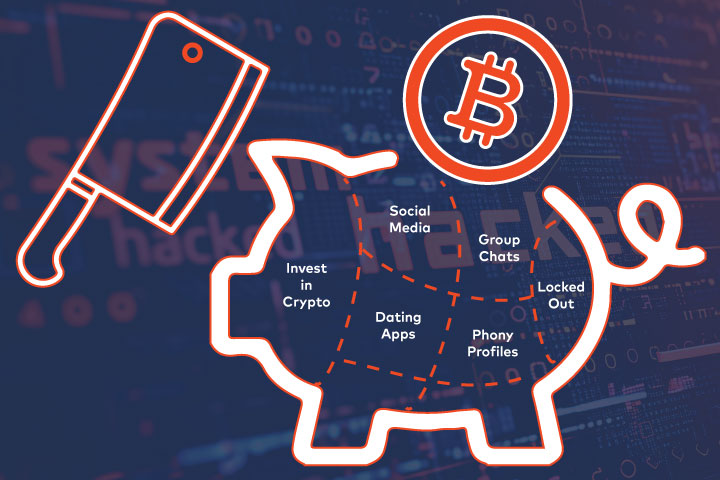This story you are about to read is a real-life story of a recently divorced, middle-aged NDBT female customer who fell victim to a financial grooming scam that started as a romantic relationship with a foreign male working overseas. After responding to a message on the Hinge app, “Louis” almost immediately asked for her phone number to transfer their conversation away from the dating app. The charming, younger business professional with European roots seemed to show no signs of a “gold-digger” but only care and love. Romantically involved for a few months but never seeing the “sweetheart” in person, the woman was convinced to invest in cryptocurrency through the con artist’s “friend,” who claimed to profit from short-term investments. Smitten with love, the victim willingly sent multiple wire transfers to www.crypto.com over several months for different amounts, totaling almost $1.5 million. After her funds were moved to a Bitpie crypto wallet by “the trusted friend,” she was given access to an online crypto platform to watch her investments produce “fast-growing” profits.
One day, the customer needed money for an emergency and intended to withdraw funds after watching her crypto investment account grow day after day into millions of dollars. To her surprise, the request caused extreme anger from the Bitpie “investor.” Suspecting the worst, she also tried to send a wire transfer out of her Bitpie investment account and was forced to pay a 20% deposit fee to get her account “unfrozen.” Of course, she was “promised” to be reimbursed for the extra expenses. Unfortunately, that step led to more threats and demand for more money from the “investor.” Already on high alert, the female customer refused to pay up to receive her money. The worst happened instantaneously – the woman’s boyfriend stopped returning her calls and text messages. His ghosting behavior turned into radio silence, leaving her without a means to live and with a broken heart. The customer’s loss totaled almost $1.2 million.
After learning of this horrific story, our hearts go out to millions of victims who fall for this intricately organized cybercrime that has been shaking the world since early 2016, known as “pig butchering.” Originating in China, “pig butchering” translated from Chinese means “fattening up a pig” and “slaughtering” it. The scam rapidly spread to Southeast Asia and hit the U.S. during the COVID-19 pandemic. According to the FBI Cryptocurrency Fraud Report for 2023, 69,000 complaints regarding this financial grooming scam were filed with over $5.6 billion in reported losses.
The financial grooming scam starts with the recruitment of syndicate employees who also happen to be victims of promising overseas employment opportunities, kidnapped or trafficked victims moved to another location. Held hostage against their will with no identification documents and minimum means of living, they are forced to commit fraud by organized crime rings with one goal – to stay alive. Equipped with the latest technologies, they spend numerous hours cruising the Internet for a potential “catch” – reading profiles on dating websites and searching social media accounts to send accidental phishing messages that establish initial contact. By profiling their potentially vulnerable adult targets who happen to be recently widowed or divorced, incredibly lonely and often elderly people, fraudsters gather as much information as possible to use in the future.
This notorious scam combines both elements – romance and investment fraud. Upon establishing the first contact, con artists quickly move conversations to encrypted messaging apps such as WhatsApp & Telegram messengers to hide their tracks and not get caught. Love bombing and video chats are all part of the “big game” that might last several months. The sudden friendship grows into a romantic relationship, where con artists gain the good faith, love, and friendship of their victims. Using emotional and psychological manipulation and creating excessive drama, they slowly allure their prey into a web of lies. Until one day, a scammer says, “I’ll do this just for you because I love you, and you mean so much to me!” Portraying themselves as well-to-do individuals and business professionals who built their fortune with the help of their “special friend” who makes short-term investments and guarantees large profits. Victims use “no risk” crypto investments and send wire transfers directly to third parties or cryptocurrency investment firms. They are given online access to phony profiles specially created to check on their investments progress. When the money flow stops, the investment websites get shut down, and “sweethearts” disappear without saying goodbye. Penniless and heartbroken individuals are left to go through emotional and financial suffering.
Though most of the stolen money is never recovered, the FBI’s recent initiatives have been making some progress in seizing cryptocurrency accounts and digital wallets, leaving people with a glimpse of hope to get justice.
In our story, with the help of dedicated NDBT retail and back-office teams, our customer was able to recover some funds, but at what cost?! No matter how scared, confused, or embarrassed one can be to admit they fell for a scam, please know there are committed bankers who will take time to listen without judging and who will go out of the way to do the right thing the right way by their customers.
There is always time to report a scam. Please follow these links if you ever fall victim to one:
The Internet Crime Complaint Center (IC3)
The Federal Trade Commission (FTC)
And always be skeptical! If it sounds too good to be true, it most likely is.
For additional information, please read related articles:
https://www.fdicoig.gov/pig-butchering-scams
https://www.fdicoig.gov/sites/default/files/document/2024-05/Scam%20Alert%20Flyer_Consumer.pdf






